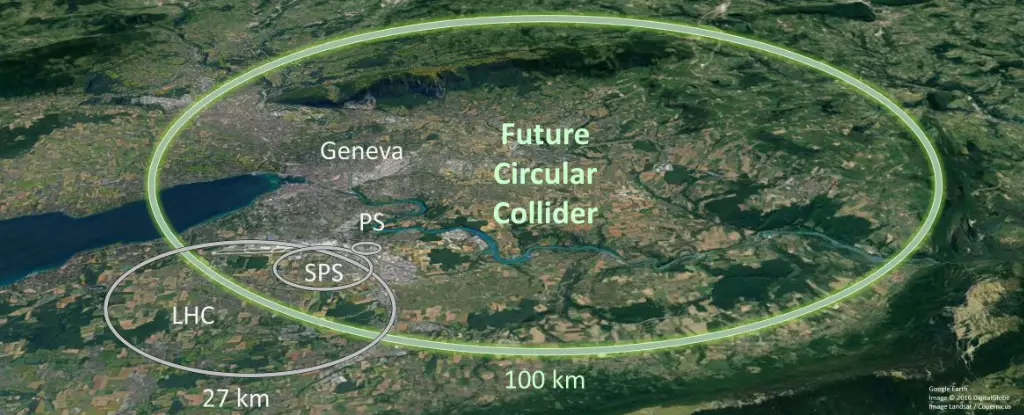The Future Circular Collider (FCC) proposal represents a bold attempt to propel Europe into a new frontier of scientific discovery. With a staggering price tag of approximately $17 billion, the project promises to create the world’s largest particle accelerator, dwarfing the existing Large Hadron Collider (LHC) by more than threefold. CERN’s director, Fabiola Gianotti, insists this colossal endeavor is vital for preserving Europe’s lead in fundamental physics amid fierce competition from non-European entities, particularly China. However, one must ask whether this quest for scientific excellence is worth the staggering costs and the ethical implications surrounding it.
There is a palpable excitement surrounding the potential scientific breakthroughs that the FCC could yield—including deeper insights into the Higgs boson phenomenon. Yet, we must scrutinize whether these potential benefits justify the exorbitant funding and the socioeconomic and environmental costs associated with such a prodigious project. In an era where fiscal prudence and environmental concerns are at the forefront of societal debates, can we genuinely endorse financing a colossal and controversial scientific endeavor?
The Ethical Dilemma of ‘Pharaonic’ Investments
Critics have decried the FCC as a “pharaonic” project, an apt descriptor when considering its monumental dimensions, costs, and consequences. In stark contrast to the lofty aspirations of scientific advancement, the stark reality remains: this initiative will encroach on the lives and livelihoods of local communities. Farmers are facing land requisitions, and residents in affected regions are experiencing fears about the disruption of their daily lives. Thierry Perrillat’s poignant statement about his farm being swallowed up by the collider encapsulates the broader moral question here: at what point do we sacrifice the well-being of individuals for the sake of progress?
Undeniably, scientific progress is crucial, but there comes a tipping point where ambition transforms into recklessness. The financial prioritization of a project with vague outcomes over smaller initiatives that directly benefit communities and urgent societal issues shines a spotlight on the mismatch between scientific aspirations and socioeconomic realities. Instead of pouring billions into the FCC, why not invest in numerous smaller projects that can produce more immediate, tangible benefits? The current global landscape demands a reevaluation of our priorities, and this megaproject may stand as a testament to misplaced values.
A Global Competition Fuels Uncertainty
The shadows of international rivalry loom large over CERN’s ambitions. Gianotti emphasizes a sense of urgency in ensuring Europe remains competitive in the global scientific arena; however, is this fervor blinding us to the genuine risks associated with large-scale investments? While the spirit of competition can be a strong motivator, it should never come at the cost of environmental sustainability or social responsibility. If the FCC’s substantial funding derives from member states, the ethical responsibility grows heavier.
Germany, recognized as CERN’s largest contributor, has already raised eyebrows regarding the project’s far-reaching financial implications, raising questions about the viability of securing such significant funding. There’s a collective anxiety burgeoning among member states that financial mismanagement could undermine the pursuit of groundbreaking discoveries. At this critical juncture, rather than leaning solely into grandiose ambitions, we must prioritize sustainable scientific developments that truly benefit humanity—readily accessible research that local communities can rally behind.
The Environmental Concerns: An Inescapable Reality
Environmental groups have been at the forefront of opposition, raising alarm bells about the astronomical energy demands and climate impacts associated with the FCC project. Organizations like WWF and Greenpeace have signaled the urgency of these concerns, fueling public discourse around the environmental ethics entwined with scientific advancement. Understanding the complexities of our environmental crises requires an array of solutions; pouring resources into a single colossal project that promises uncertain outcomes may not be the answer.
As CERN seeks to mitigate environmental impacts, mere assurances fall short of substantive action. The complexity of climate challenges necessitates a careful analysis of the ecological footprint of such grand investments. Ignoring these implications could have dire consequences, painting a bleak picture of a future where scientific ambition does not factor in its harsh consequences on our planet.
A Community Divided: Voices from the Ground
The ongoing debates surrounding the FCC project have crystallized a significant divide within the community. Some local officials, such as Ferney-Voltaire’s mayor Daniel Raphoz, tout the project as a boon for job creation and energy utilization—hoping to leverage CERN’s resources to benefit the local populace. Yet others voice skepticism, questioning whether the promise of progress is worth the sacrifices that will inevitably accompany it.
It appears that the allure of scientific discovery and societal gain may not resonate equally with all stakeholders. Detractors, like physicist Olivier Cepas, advocate for a more balanced approach to funding, implying there exists an alternative path that prioritizes smaller, impactful studies over one or two colossal investments. This sentiment may reflect a larger, unresolved debate within the scientific community about the future of research funding—one that hints at a necessity to recalibrate not just our ambitions but the very foundations of scientific inquiry in an ever-evolving world.

